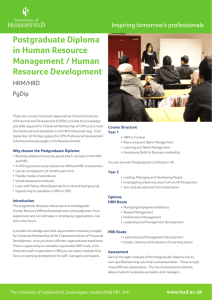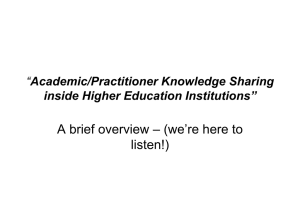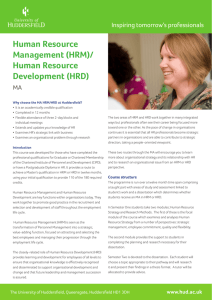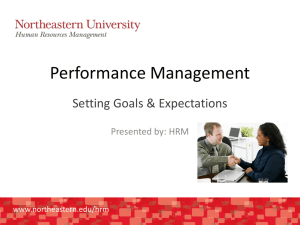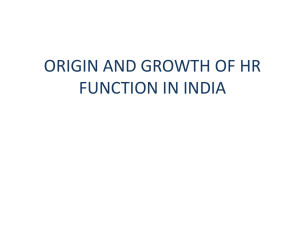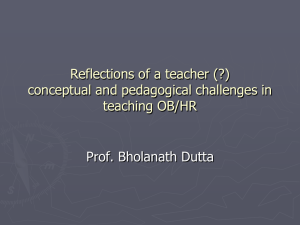programme title – master in hrm and development
advertisement
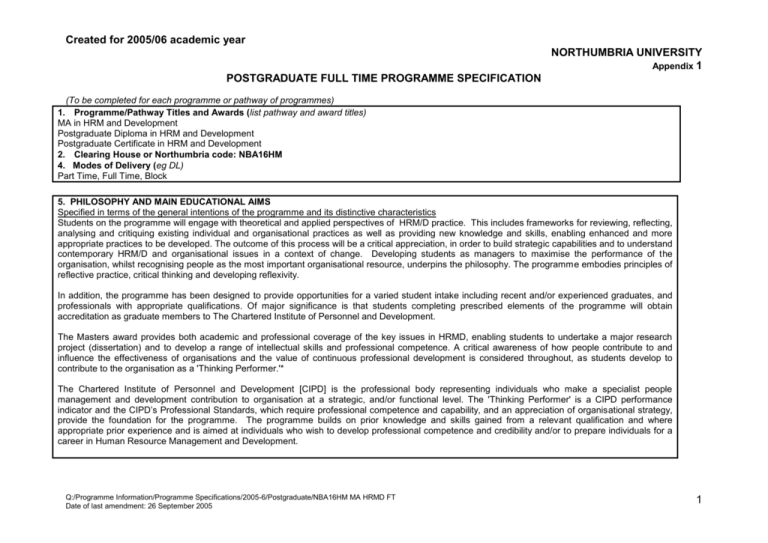
Created for 2005/06 academic year NORTHUMBRIA UNIVERSITY Appendix 1 POSTGRADUATE FULL TIME PROGRAMME SPECIFICATION (To be completed for each programme or pathway of programmes) 1. Programme/Pathway Titles and Awards (list pathway and award titles) MA in HRM and Development Postgraduate Diploma in HRM and Development Postgraduate Certificate in HRM and Development 2. Clearing House or Northumbria code: NBA16HM 4. Modes of Delivery (eg DL) Part Time, Full Time, Block 5. PHILOSOPHY AND MAIN EDUCATIONAL AIMS Specified in terms of the general intentions of the programme and its distinctive characteristics Students on the programme will engage with theoretical and applied perspectives of HRM/D practice. This includes frameworks for reviewing, reflecting, analysing and critiquing existing individual and organisational practices as well as providing new knowledge and skills, enabling enhanced and more appropriate practices to be developed. The outcome of this process will be a critical appreciation, in order to build strategic capabilities and to understand contemporary HRM/D and organisational issues in a context of change. Developing students as managers to maximise the performance of the organisation, whilst recognising people as the most important organisational resource, underpins the philosophy. The programme embodies principles of reflective practice, critical thinking and developing reflexivity. In addition, the programme has been designed to provide opportunities for a varied student intake including recent and/or experienced graduates, and professionals with appropriate qualifications. Of major significance is that students completing prescribed elements of the programme will obtain accreditation as graduate members to The Chartered Institute of Personnel and Development. The Masters award provides both academic and professional coverage of the key issues in HRMD, enabling students to undertake a major research project (dissertation) and to develop a range of intellectual skills and professional competence. A critical awareness of how people contribute to and influence the effectiveness of organisations and the value of continuous professional development is considered throughout, as students develop to contribute to the organisation as a 'Thinking Performer.'* The Chartered Institute of Personnel and Development [CIPD] is the professional body representing individuals who make a specialist people management and development contribution to organisation at a strategic, and/or functional level. The 'Thinking Performer' is a CIPD performance indicator and the CIPD’s Professional Standards, which require professional competence and capability, and an appreciation of organisational strategy, provide the foundation for the programme. The programme builds on prior knowledge and skills gained from a relevant qualification and where appropriate prior experience and is aimed at individuals who wish to develop professional competence and credibility and/or to prepare individuals for a career in Human Resource Management and Development. Q:/Programme Information/Programme Specifications/2005-6/Postgraduate/NBA16HM MA HRMD FT Date of last amendment: 26 September 2005 1 Created for 2005/06 academic year NORTHUMBRIA UNIVERSITY Appendix 1 *The Thinking Performer is a CIPD Professional Standard. Thinking is developed by exposure to a wide range of influences, both in the range of study and in the diversity of the student cohort. There is an emphasis in modules on critical analysis and reflection and in the programme through CPD and reflective learning. The management report project emphasises analysing an organisational situation and critically applying theory to it, in order to reflect and offer alternatives for change. Performing is developed by the expectation that solutions to problems reflect an awareness of the practical difficulties and context of any proposed solution, an expectation explored by the widespread use of case studies. An emphasis on competence development, either is developed through those aspects of the module assessments and management report which emphasise the importance of identifying the practicality of recommendations and actions and those elements of the CPD process which require an appreciation of self – analysis and future practice. The programme aims to: Develop HRM/D academic and professional knowledge and personal/professional competence development in line with both academic Postgraduate and CIPD professional standards Develop critical reflection and engagement with organisation and HRM/D theory to understand and where appropriate, challenge existing individual and organisational perspectives and practices Develop and where appropriate, apply new knowledge to add value by enhancing individual and organisational capability Develop commitment to continuous personal/professional development, independent and reflective learning In addition to the general core programme, students will have the opportunity to follow an International Human Resource Management Pathway by choosing the module International HRM, and undertaking a management report and/or where appropriate a dissertation in this area. Develop a critical and reflexive understanding of the conceptual frameworks and methodologies required for undertaking a rigorous investigation within the applied field of HRM/D and assess its contribution to the emergent field of research in HRM/D. HOW STUDENTS ARE SUPPORTED IN THEIR LEARNING/EMPLOYABILITY/CAREER DEVELOPMENT (curriculum design, placements, fieldwork, practical projects, progress files) Curriculum design: The curriculum has been designed with consideration of the CIPD Professional Standards, consultation with current students and alumni, employers and the local CIPD North East Branch, in addition to consideration of academic subject development and research and consultancy developments within NBS. It therefore aims to meet the needs of regional organisations, the Professional Body, individual career development and reflects, where appropriate, the NBS research agenda. The programme is designed for those who are or who wish to become involved in the management of people and to practice in the area of HRM/D. There are two main groups of potential students; graduates wishing to embark upon a career within a HRM/D context and individuals who are already experienced HRM/D professionals but who wish to consolidate this and develop further by completing the academic and professional programme. On successful completion of the programme students become Graduate Members of CIPD and following Continuous Professional Development [CPD], can apply to become full members of the Institute. The dissertation element of the programme is supported by series of workshops delivered throughout the taught programme; these underpin the dissertation preparation and provide knowledge and skills of research methodologies and methods necessary to undertake primary research. Q:/Programme Information/Programme Specifications/2005-6/Postgraduate/NBA16HM MA HRMD FT Date of last amendment: 26 September 2005 2 Created for 2005/06 academic year NORTHUMBRIA UNIVERSITY Appendix 1 Induction: An induction to the programme and to Northumbria University is provided, offering an opportunity to discuss expectations; explore issues relating to the mechanics of the programme and provide practical help in terms of study skills and assignment writing. The expectation that students will engage in personal continuous professional development will be introduced at this stage. Participants will be allocated a personal tutor, likely to be the year tutor or programme leader in the first instance, who is available to the student for personal guidance on an individual basis. Overseas students are invited to attend a series of induction events provided by the university to introduce students to the range of specialist support and advisory services developed specifically to meet the needs of international students. CPD Process: As part of professional requirements and to frame CPD on the programme, students on all modes will be required to maintain a learning log throughout their study, which will provide them with a record of learning and development progress. They will be encouraged to reflect on each new experience, training, research or teaching activity, recording their initial and considered reaction, and identify both learning and shortfalls in learning. Potential and chosen strategies to meet these shortfalls will also be identified and recorded. Students will form action learning sets to support their learning within taught sessions and to develop independent learning outside the classroom. The module Analysing and Developing Self provides the initial underlying philosophy to a critically reflective approach to CPD. Furthermore the module supports the development of relevant knowledge and skills for learning to learn, individual learning and actively encourages the development of learning managers through the use of learning sets. The action learning group process and the CPD process will be explored and framed within this module as the basis for the rest of the programme. In addition to the formal taught elements of the programme, a series of opportunities for CPD and specific skills development supports the career development of the student: A programme residential, which is based on developing and understanding of self and others within the context of individual and group processes and behaviour. This residential also introduces the CIPD competencies and formalizes the CPD process and CPD learning log for these students. An integrated sequential based on a negotiation exercise provides an opportunity for the development of numerous generic and HRM/D skills. Further skills sequentials are normally offered in Behavioural Event Interviewing, Development and Learning and Employee Relations/Law depending on the option choice taken by the student. Students are also required to practice CPD by participating in development opportunities within NBS such as the Corporate Guest Speaker Programme, access to organisations and to attend the local CIPD Branch meetings and where possible the National CIPD Conference in Harrogate to support their CPD process. Q:/Programme Information/Programme Specifications/2005-6/Postgraduate/NBA16HM MA HRMD FT Date of last amendment: 26 September 2005 3 Created for 2005/06 academic year NORTHUMBRIA UNIVERSITY Appendix 1 7. INTENDED LEARNING OUTCOMES specified in terms of performance capabilities to be shown on completion of the programme/pathway Knowledge and understanding Demonstrate a critical awareness of themselves and their impact on others within their HRM/D role [Analysing and Developing Self & Organisations and Performance, PMD, RDOC, Electives/Options] Demonstrate relevant knowledge and understanding of HRM/D in organisations, the internal and external contexts in which this operates and how this is managed [all modules] Utilise both theoretical and applied perspectives and be able to apply a range of specialist skills in organisations and the context in which they as specialists may operate [all modules] Critically analyse current research and thinking and organisational practice, and provide appropriate alternatives, communicating their findings accordingly [Specifically in Analysing and Developing Self & Organisations and Performance, Management Report. Generally addressed in all modules] Conceptually understand and evaluate the rigour and validity of research and assess its relevance to new situations [Specifically in Analysing and Developing Self & Organisations and Performance, Management Report. Generally addressed in all modules] Use new and emergent knowledge to identify improvements to enhance personal and organisational effectiveness and where appropriate implement change [All modules] Develop a range of critical and intellectual skills, research skills, personal and interpersonal skills and lifelong learning/CPD approaches and skills [Across the programme] Demonstrate a rigorous and critically reflexive evaluation of the contribution of conceptual and applied frameworks that inform chosen topic of research in HRM/D [Dissertation module] Intellectual Skills Utilise their knowledge, understanding and transferable skills through the application of appropriate methods to critically evaluate theory and practice Identify, formulate and solve HRM/D and organisational issues through the application of appropriately structured analytical approaches. Synthesise learning from theory and practice to develop new knowledge and new applications, adding value to the organisation where appropriate. Conduct primary research into organisational and HRMD issues that requires familiarity with a range of data, sources and appropriate methodologies and methods. Demonstrate critical and reflexive thinking Demonstrate an ability to undertake independent study and management of their own learning and continuous professional development Conduct a detailed investigation within the field of HRM/D, in line with a reflexive mode of enquiry, demonstrating a critical approach to methodology, synthesis of findings and assessing the contribution of the research findings within the emergent field of research in the chosen topic area. Q:/Programme Information/Programme Specifications/2005-6/Postgraduate/NBA16HM MA HRMD FT Date of last amendment: 26 September 2005 4 Created for 2005/06 academic year NORTHUMBRIA UNIVERSITY Appendix 1 c. Practical Skills / Transferable Skills Students will be able to demonstrate their professional competence development via a CPD Learning Log against the CIPD competencies shown below. Opportunities for development of specific competencies are identified within each module. Personal drive and effectiveness People management and leadership Business understanding Professional and ethical behaviour Added value result achievement Continuing learning Analytical and intuitive creative thinking Customer focus Strategic thinking Communication, persuasion, interpersonal skills 8. Teaching Learning and Assessment Strategy Specified to enable learners to achieve and demonstrate the above learning outcomes Learning and Teaching: Programme content is delivered via subject specific modules. Modules are delivered by a series of sessions based around formal input, workshop activities, case discussions and practical exercises, supported by tutor - led directed learning utilised to meet module learning outcomes. Examples include utilising video, film, presentations, group discussions and individual and group presentations. Tutor - led learning will engage the student in further research work to support and enhance learning in the sessions. Independent learning is reading which the student identifies, either pursuing areas of interest or providing deeper or broader knowledge of the subject area. Current NBS research and consultancy informing subject development will be made explicit within each module. Students can expect a balance of lecture based input and workshop/seminar activities which facilitates students to apply theory to 'real life' situations, critically analysing and making recommendations for appropriate ways forward for the organisation / individual. Sessions will include an opportunity for students to participate in the process of knowledge generation, peer interaction, communication and contextual application. Critical reflection on knowledge, experience and practice underpins the learning and teaching process along with the explicit development of competence. The modules are supported by a teaching and learning plan, which outlines the process and frameworks for learning, tutor - led work, competence development, CIPD operational indicators and independent reading. The necessity of tutor - led work and independent reading are critical dimensions of the programme and modules, thus developing the student as an independent learner. Students are therefore expected to allocate significant personal study time outside their attendance at NBS. A series of taught workshops, mainly introducing students to research methodologies and methods, will underpin the dissertation. A tutor will be appointed at an early stage to assist in the formulation of a research proposal (assessed) and to provide on-going support to the student whilst preparing the dissertation. Q:/Programme Information/Programme Specifications/2005-6/Postgraduate/NBA16HM MA HRMD FT Date of last amendment: 26 September 2005 5 Created for 2005/06 academic year NORTHUMBRIA UNIVERSITY Appendix 1 Assessment Strategy: The programme utilises a range of methods to assess the learning outcomes of the programme and the modules. A reflective approach to learning and the CIPD framework for assessment informs the balance of the assessment strategy. The Northumbria marking criteria will be followed throughout assessments, with the CIPD Professional Standards as equating to the minimum level of a module pass. Assignments: All assignments are designed to test students’ understanding of theory and applied perspectives and their ability to use this appropriately to critically analyse individual and/or organisational practices, evaluating current practice and research in order to modify and develop their own and the organisation's approaches. Criteria will be provided to enable students to understand what is expected of them and how they will be judged on their performance. Students are required to demonstrate self-reflection and reflective practice where appropriate and to demonstrate reflexivity in relation to rigorous exploration of their beliefs and behaviours as individuals who critically analyse situations and theory. This is part of empirical evidence and must be open to critical scrutiny. This kind of relationship between the researcher and the object of research is usually discussed as the reflexivity of social science (Harding, 1987). Students will be provided with feedback on their assignments and as part of reflective practice and CPD, this feedback can be utilised in the preparation of subsequent assessments. Examinations: Examinations in the programme are designed to assess learning outcomes including utilisation of knowledge and understanding, ability to synthesise theory and practice, and provide evidence of critical and reflexive thinking. Students are required to demonstrate knowledge indicators as described by the CIPD as the minimum to gain a pass mark. In order to demonstrate the above, examinations normally take the form of analysing case study scenarios and through essay writing. The Management Report and Continuous Professional Development Log: Students will receive a Management Report orientation and Introduction to Research Methods session following which students will be required to submit an outline proposal detailing topic for investigation, proposed methodology and main literature sources. To support the management report process students will be allocated to learning sets with a staff facilitator for both the Management Report and, where appropriate, the CPD process. The aim is to encourage the ownership of the project by the student within a supportive peer group. Learning sets for the Management Report will meet in fortnightly timetabled slots over the academic year. Students are encouraged to take the opportunity to meet in the alternative weeks in their action learning set to review progress. The nature of learning sets is such that students will determine the nature, structure and content of these sessions - however, it is anticipated that these sessions will broadly follow the research process. The Learning Set facilitator will also act as report supervisor for the purposes of individual guidance and support. Dissertation A series of taught workshops, mainly introducing students to research methods, will underpin the dissertation process. A tutor will be appointed at an early stage to assist in the formulation of a research proposal [assessed] and to provide on going support to the student throughout the dissertation process. This is integrated and builds on the research methods module in the taught component. 9. VARIATION FROM ASSESSMENT REGULATIONS Provide details of any approved variations from the standard University regulations. Students following the General Pathway must pass the ‘Management Report’ (HR843) module in order to successfully achieve the PG Diploma in HRMD. Furthermore, students completing the General Pathway must complete 120 credits of the prescribed diet to be entitled to Graduate Membership of Chartered Institute of Personnel and Development. Students taking the International Pathway must pass all modules on the programme to be entitled to Graduate Membership of Chartered Institute of Personnel and Development. Q:/Programme Information/Programme Specifications/2005-6/Postgraduate/NBA16HM MA HRMD FT Date of last amendment: 26 September 2005 6 Created for 2005/06 academic year NORTHUMBRIA UNIVERSITY Appendix 1 Programme Structure Masters in HRM and Development Full Time [D 18 modules per calendar year] R E S E A R C H M E T H O D S P R O G R A M M E & P R O P O S A L C O N T I N U O U S 60 SM468 pts Strategy & the External Environment Credit Value 10 MN456 HR852 NB424 Information & Management Analysing and Developing Self Managing for Value Creation Credit Value 10 Credit Value 10 Credit Value10 NB422 Disseration Preparation and Research Methods HR838 People Management & Development Credit Value 20 Credit Value 0 P R O F E S S I O N A L D E V E L O P M E N T GENERAL HRM & D PATHWAY 120 HR457 pts Employee Relations Credit Value 10 HR863 Option* Analysing Organisations and Performance Credit Value 10 Credit Value 10 INTERNATIONAL HRM PATHWAY 120 HR855 pts International HRMD Option* Credit Value 10 180 pts HR843 Credit Value 10 HR863 NB422 HR839 Management Dissertation Resourcing and Developing for Report Preparation and Organisational Capability Research Credit Methods** Value 10 Credit Value 20 Credit Value 0 HR843 NB422 HR839 Analysing Organisations and Performance Management Dissertation Resourcing and Developing for Report Preparation and Organisational Capability Research Credit Methods** Credit Value 10 Value 10 Credit Value 20 Credit Value 0 HR845 Masters Dissertation Credit Value 60 *Option of 10 points from HR466 Managing Diversity, HR418 Advanced Personnel Selection, LA086 Employment Law, HR464 Reward, HR841 Management Development ** This is normally delivered with the PT PG DIP Students in Semester 1 so that they can proceed to do ‘Employment Law’ in Semester 2 Q:/Programme Information/Programme Specifications/2005-6/Postgraduate/NBA16HM MA HRMD FT Date of last amendment: 26 September 2005 7 Created for 2005/06 academic year NORTHUMBRIA UNIVERSITY Appendix 1 LEARNING OUTCOMES for STAGED AWARDS Postgraduate Certificate learning outcomes: Through the breadth of the CIPD ‘Core Management’ and ‘People, Management Development’ fields students will be able to: Demonstrate a critical awareness of themselves and their impact on others within their HRM/D role [Analysing and Developing Self & Organisations and Performance, PMD] Demonstrate relevant knowledge and understanding of HRM and Development in organisation, the internal and external contexts in which this operates and how this is managed [Strategy, Information, Analysing and Developing Self & Organisations and Performance, PMD] Use new knowledge to identify improvements to enhance personal and organisational effectiveness and where appropriate implement change [Strategy, Information, Analysing and Developing Self & Organisations and Performance, PMD] Develop a range of critical and intellectual skills, research skills, personal and interpersonal skills and lifelong learning/CPD approaches and skills [Strategy, Information, Analysing Self and Organisation, PMD] Postgraduate Diploma learning outcomes: Through the specialist knowledge developed through the second stage of the award, students will be able to meet the above plus: Critically analyse current research and thinking and organisational practice, and provide appropriate alternatives, communicating their findings accordingly [Specifically in Analysing and Developing Self & Organisations and Performance, Management Report. Generally addressed in all modules] Conceptually understand and evaluate the rigour and validity of research and assess its relevance to new situations [Specifically in Analysing and Developing Self & Organisations and Performance, Management Report. Generally addressed in all modules] MA learning outcomes Through specialist knowledge developed in the earlier stages of the programme, underpinned by the dissertation workshops, students will be able to meet the above plus: Demonstrate a rigorous and critically reflexive evaluation of the contribution of conceptual and applied frameworks that inform a chosen topic of research in HRM/D [Dissertation module] Conduct a detailed investigation within the field of HRM/D within a reflexive mode of enquiry demonstrating a critical approach to methodology, synthesis of findings and assessing the contribution of the research findings within the emergent field of research in the chosen topic area. PROGRAMME TITLE – MASTER IN HRM AND DEVELOPMENT Q:/Programme Information/Programme Specifications/2005-6/Postgraduate/NBA16HM MA HRMD FT Date of last amendment: 26 September 2005 8 Created for 2005/06 academic year NORTHUMBRIA UNIVERSITY Appendix 1 MAPPING OF PROGRAMME LEARNING OUTCOMES (section 11) a. Knowledge and understanding Demonstrate a critical awareness of themselves and their impact on others within their HRM/D role [Analysing and Developing Self & Organisations and Performance, PMD, RDOC, Electives/Options] Demonstrate relevant knowledge and understanding of HRM and Development in organisation, the internal and external contexts in which this operates and how this is managed [all modules] Utilise both theoretical and applied perspectives and be able to apply a range of specialist skills in organisations and the context in which they as specialists may operate [all modules] Critically analyse current research and thinking and organisational practice, and provide appropriate alternatives, communicating their findings accordingly [Specifically in Analysing and Developing Self & Organisations and Performance, Management Report, Dissertation. Generally addressed in all modules] Conceptually understand and evaluate the rigour and validity of research and assess its relevance to new situations [Specifically in Management Report, Dissertation. Generally addressed in all modules] Use new knowledge to identify improvements to enhance personal and organisational effectiveness and where appropriate implement change [All modules] Develop a range of critical and intellectual skills, research skills, personal and interpersonal skills and lifelong learning/CPD approaches and skills [Across the programme] b. Intellectual Skills Utilise their knowledge, understanding and transferable skills through the application of appropriate methods to critically evaluate theory and practice [Management Report, Dissertation] Identify, formulate and solve HRM/D and organisational issues through the application of appropriately structured analytical approaches [People, Management, Development, Resourcing and Development for Organisational Capability, Employee Relations, Management Report Dissertation and options] Synthesise learning from theory and practice to develop new knowledge and new applications, adding value to the organisation [All modules] Conduct primary research into organisational and HRMD issues that requires familiarity with a range of data, sources and appropriate methodologies and methods. [Analysing and Developing Self & Organisations and Performance, Management Report, Dissertation] Demonstrate critical and reflexive thinking [All modules] Demonstrate an ability to undertake independent study and management of their own learning and continuous professional development [Across the programme and CPD log] Q:/Programme Information/Programme Specifications/2005-6/Postgraduate/NBA16HM MA HRMD FT Date of last amendment: 26 September 2005 9 Created for 2005/06 academic year NORTHUMBRIA UNIVERSITY Appendix 1 c. Practical Skills / Transferable Skills - SEE ATTACHED MATRIX Personal drive and effectiveness People management and leadership Business understanding Professional and ethical behaviour Added value result achievement Continuing learning Analytical and intuitive creative thinking Customer focus Strategic thinking Communication, persuasion, interpersonal skills ADMISSION REQUIREMENTS The ability to benefit from University of Northumbria programmes is assessed on a combination of academic and personal qualities which can be demonstrated in a number of ways. Successful completion of a Degree level study (or some other equivalent qualification) is just one way. Students who can in other ways demonstrate their ability to benefit from a University of Northumbria programme, in particular mature students without formal qualifications, will always be considered and are invited to contact the admissions tutor to discuss their application. It is University policy to recognise a wide variety of evidence, and potential applicants may wish to discuss this aspect of their application with the admissions tutor. Standard entry Requirements A Level (subjects and points): GNVQ/NVQ: HEFC:(as delivered by local FE colleges) Other Access Courses: Art&Design Foundation courses: Other (e.g. mature students): N/A N/A N/A Newcastle Business School's Foundation Certificate in Management Development or university degree N/A An acceptable professional qualification equivalent to one of the above plus, 2-5 years managerial / supervisory experience. In general, candidates should normally occupy a position of managerial/supervisory responsibility in order to be able to carry out the competence requirements of the programme in a work situation. The programme requires students to engage with packages such as Excel. Students entering the programme without Data Analysis prior knowledge are advised to begin their development as soon as possible. Newcastle Business School may support students by offering a short course in this area but this will be in addition to the programme fee. As above + IELTS 6.5 Overseas (please enter): NB. Applications will be considered on an individual basis and where appropriate, prospective students are able to contact programme leaders to discuss their suitability for the programme. Q:/Programme Information/Programme Specifications/2005-6/Postgraduate/NBA16HM MA HRMD FT Date of last amendment: 26 September 2005 10 Created for 2005/06 academic year NORTHUMBRIA UNIVERSITY Appendix 1 Admissions with Advanced Standing: (indicate as appropriate for all potential entry points after Year 1, Semester 1). Entry with Advanced Standing Academic Applicants with MBA qualifications can apply to CIPD for LICENTIATE status and will be given module exemptions against the following qualifications: modules: Information Management, Strategy and the External Environment and Managing for Value Creation. Applicants who hold Licentiate membership of CIPD will be given advanced standing to the Postgraduate Programmes dependant on the CIPD Professional Standards covered through their membership and the match to programme modules. While those who have full Membership of CIPD will enter the new MA HRM ‘top up’ programme (NBE16HR). Experience/APE L: No advanced entry will be given on the basis of prior experience alone. Applicants may however, apply to UNN for APEL through the formal procedures. 13. APPLICATIONS PROCEDURE Applicants complete a standard university application form, supported by interview where appropriate. Academic Programme Leaders will make selection decisions on the basis of the application information and any discussions. Each application will be considered on an individual basis. Early application is imperative as the programme is often over subscribed and normally works on a group size of 35. Interviews will be held where the suitability of the applicant is unconfirmed and further discussion is required; applicants present an unusual set of qualifications taken or pending or when applicants need advice on the preparatory programme of study. Applicants invited for interview will always be told its purpose. 14. 15. 16. 17. 18. QAA Subject Benchmark Group: Date of Approval/Review: Collaborative Provision: Franchise/ Franchise OS/Validated(specify type) Date of Collaborative Approval/Review: Amended and Updated 08/03/04 Q:/Programme Information/Programme Specifications/2005-6/Postgraduate/NBA16HM MA HRMD FT Date of last amendment: 26 September 2005 11

